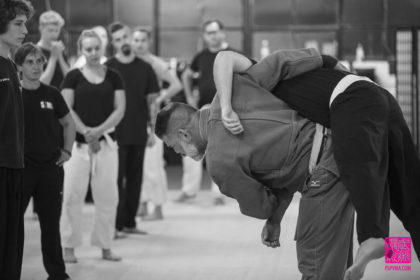
photo by Francine Schaepper
Growing up in the martial arts during the 1980s, one of the primary tenets of practice was something they called “good citizenship”. The concept dates back to at least the 1800s, to Mr. Jigoro Kano‘s belief that a practitioner needed to be a useful citizen to society.
But today it sounds very outdated, even antiquated. Even though I was surrounded by the concept as a young practitioner, I still struggle to understand what it means today.
Why?
Much of what seemed to make a “good citizen” doesn’t show up the way it used to. There’s a shift in the role of the “good citizen” in the face of violence, terrorism, fear. Plus we’re regularly encountering dissent and dissatisfaction, inequality, and uncertainty about how to deal with our greatest challenges.
As a result of this, there isn’t a fixed concept of “good citizenship” anymore, in the way that it might have existed one or two centuries ago.
So…how do we even begin to navigate the notion of “good citizenship” for martial artists today? Is there even a place for it?

Jigoro Kano, founder of Judo
I believe yes. Starting from where we are, we can create an intelligent revision of this precept, getting back to what Mr. Kano was talking about. We can build out of the principles that are already present inside training to generate a sense of community.
See, to my mind, “good citizenship” is connected to our how we relate to our peers and partners. It’s not exactly about the Golden Rule – you know, “do unto others as you would have done to you” – but it’s close.
It’s much more like the inverse: “don’t do terrible things to other people, because you hate when people do them to you.”
In the dojo, we treat fellow practitioners with respect. We make room for others. As the senior student, we uphold a good model for the new people. As the junior student, we open ourselves to the possibility that we don’t know everything.
But this operates in the “real world” also.
For instance…
- I hate when people cut me off in traffic…so I try not to do that.
- I can’t stand when people don’t say thank you when I hold the door…so I try to say thank you when someone holds the door.
- It drives me crazy when people talk about themselves all the time…so I work hard to ask people questions and not only talk about me.
So how do you manage this challenge of “good citizenship” – or proper partnership in a larger endeavor – for yourself?
That’s the central question. The answer points us to back to the essence of Mr. Kano’s recommendation.
In my experience, taking this on is worthwhile not just for you, but for your teacher and fellow students. Even for those students who have yet to come. Why? It’s part of a legacy.
It becomes more than just “break-your-arm-with-jiu-jitsu” or “kick-you-in-the-face-with-karate”…it expands into something really meaningful. The impact reaches out into the world, bringing a sense of mutual respect and civility to even the most trying times.
For more about our larger project of cooperative Jiu-Jitsu and martial arts training, visit the Brooklyn Brazilian Jiu-Jitsu (Brooklyn BJJ) website here.
Contact Gene Dunn here and Brian Glick here.
Cuts right to the heart of the matter. Martial arts is a practice that brings us closer to the role we’re supposed to play in teh world. It’s not just about serving ourselves…it’s to serve other people as well. Keep up the great work guys!